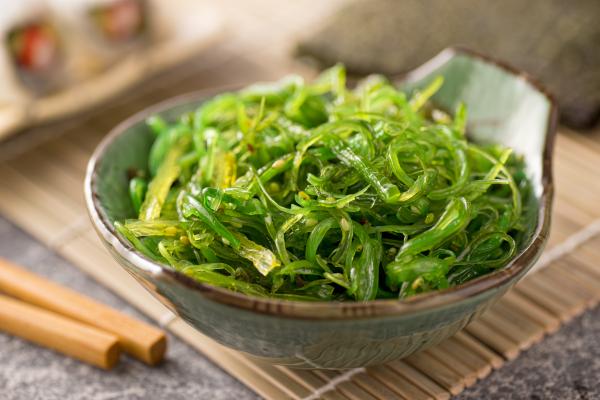Are you wondering what kelp algae is? Kelp is a type of algae that grows in marine forests, especially on the Patagonian coast at not too deep, this makes it have a characteristic color between green and brown. Due to its high nutrient content, it is considered a superfood and its consumption is very common in Asian countries. It is increasingly common to find it in health food stores, supermarkets or as a star ingredient in gourmet recipes. This extraordinary “vegetable of the sea”, has a considerable size and is made up of flat leaves, it comes from the laminaria family and has many beneficial properties for the body, although in some cases it may be contraindicated.

Kelp seaweed properties
Its rich composition gives the kelp seaweed its particular characteristics. Under its intense flavor of the sea, it hides a series of properties that translate into benefits, as long as its intake is part of a varied and balanced diet.
- It is rich in fiber; this makes it have satiating properties that are linked to a mild laxative effect.
- It contains significant amounts of polyphenols along with vitamins E and C that make it a powerful natural antioxidant. To these properties we must add the ability to accelerate metabolism by favoring thermogenesis.
- It is a source of important minerals, such as iron, magnesium, calcium and especially iodine, essential micronutrients for the body. Its remineralizing properties are known.
- In its special composition, we must also highlight its vegetable protein content, which makes it a highly protein food.
- It has purifying properties.
- It is believed that Kelp algae could also be a natural antibiotic due to its antibacterial properties.
- It has anticoagulant properties that favor the correct transit of blood flow.
Benefits of Kelp seaweed
A series of benefits are derived from its composition and properties that make kelp seaweed considered a complete and healthy food, unless there is a contraindication that discourages its intake. Among its main benefits we must highlight.
- Good ally in weight loss, mainly due to its high fiber content and the presence of alginates, a specific type of fiber that, according to a study published in the journal Food Chemistry [1], could help minimize fat absorption in the organism.
- It favors good digestion and correct intestinal transit, avoiding constipation problems, as well as fluid retention.
- Its minerals make kelp seaweed effective in preventing diseases such as anemia (due to the presence of iron) and osteoporosis, helping with its calcium to keep bones in good condition.
- Its antioxidant capacity also favors the good condition of the body as a whole, slowing down the action of free radicals, which cause aging at the cellular level. We must remember that kelp is not only eaten as food, it is also present as an ingredient in multiple cosmetic skin care products.
- The iodine it contains helps regulate the functioning of the endocrine system, especially that of the thyroid gland, being beneficial in cases of hypothyroidism (completely discouraged in the opposite case, that is, if there is hyperthyroidism). Therefore, you should know that kelp seaweed is recommended if you have hypothyroidism. Here you can read about How to treat hypothyroidism.
- Its trace elements help strengthen nails and hair.
- It protects the immune system and is effective in preventing and improving colds, flu and nasal congestion.
How to eat Kelp
Kelp seaweed supplements are present as an ingredient in many food supplements, whose intake should be done in consultation with a doctor or pharmacist. Like, for example, the kelp seaweed pills.
Are you wondering how to take kelp seaweed?
- You can find it in powder to add directly to vegetable juices and smoothies, very common in weight loss diets or even to dress and enrich healthy salads, broths or rice dishes. It is very common to use it as a condiment instead of salt.
- Another way to take this superfood is raw, adding it to salads or using its long leaves to make Asian dishes, such as sushi.
- Generally, kelp seaweed is usually found dried, in specialized stores. To eat it you just have to rehydrate them while you boil them for a few minutes. Then, you can use them in multiple preparations: sautéed, with oil and vinegar (like any other vegetable) or, for example, as if they were a particular vegetable spaghetti.
Kelp seaweed contraindications
The main problem with kelp seaweed is its high iodine content, therefore, its consumption should always be moderate and should be avoided in specific cases:
- People with hyperthyroidism should not take it under any circumstances.
- As a precaution, its intake is also not advisable in the case of pregnant or lactating women.
- If you are taking any specific medication, especially if it is a drug with anticoagulant effects, kelp is not recommended. In these cases, prior medical consultation is especially important.







